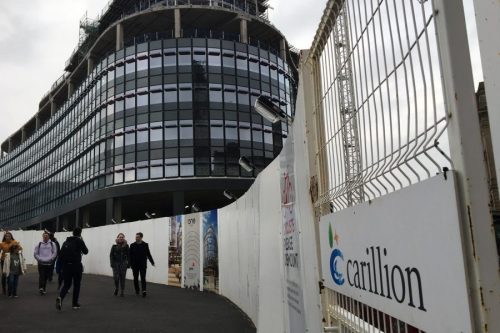East Mids firms counting the cost of Carillion collapse

Businesses throughout the East Midlands are today waking up to the fact that they could be severely impacted by the collapse of construction giant Carillion.
One company that is exposed to the downfall of Carillion is Van Elle.
The firm has announced this morning that it is owed £1.6m for work carried out by Carillion, and the its order book includes further expected work with Carillion for the remainder of the current financial year and beyond. In total, this represents approximately £2.5m of anticipated revenue for the second half of the current year.
Jon Fenton, chief executive of Van Elle said: “While it is disappointing to note the Carillion announcement we continue to develop further our strong relationship with Network Rail and its principal contractors, and remain committed to developing high quality solutions in the rail division both for upgrade and maintenance work.”
While Carillion isn’t directly involved in any East Midlands infrastructure projects, there are many that feed into the region, such as the modernisation of the Midland Main Line south of Corby and the HS2 Phase 1 works, according to Chris Hobson, director of policy at East Midlands Chamber.
Hobson added: “There are many local firms, mostly in the supply chain for major projects elsewhere in the country, which will be impacted by Carillion’s collapse.
“The Government has already said that Carillion staff working on Government contracts will continue to be paid but their money will come through the receivers, not from Carillion.
“It’s vital the Government acts immediately, where possible, to reassure the small and medium-sized enterprises in Carillion’s supply chain that the projects will continue, their contracts are safe and their workforces won’t suffer as a result of the collapse.”
According to Andrew Perry, Flint Bishop’s partner and head of construction and engineering, Carillion’s troubles will send a tremor through the construction industry and is likely to have a detrimental impact on the wider supply chain, with many companies considering how much they are owed, whether they will be able to make any recovery and what impact non-recovery will have on their own trading situation.
He said: “When an event such as Carillion happens it emphasises the need to have tight control of your own cash flow so that you can minimise the damage to your business. With the government seemingly refusing to bail Carillion out, it shows that no matter how large the company and the brand, whether it supports government projects or not, protection of your cash flow remains solely your responsibility.
“Carillion may or may not be up to date with its payment cycles (we do not know) but if not, and suppliers have been working ‘in good faith’ for a time, these suppliers may feel the effects of Carillion’s insolvency more harshly than others as their exposure is likely to cover a longer period of time. In our experience many suppliers do not take advantage of the protections afforded by their contract and legislation to protect themselves from delayed payment/supply chain insolvency for (understandably) fear of damaging the commercial relationship, and in some cases cost and time.
“There is a fine balance to be struck on any project between maintaining the commercial relationship for the current project, and hopefully future projects, and protecting your cash flow (and your business), and not ‘funding’ your employer’s project through money you have not been paid. In cases of Carillion, applying those protections appropriately could save thousands of pounds, and possibly your business.”
Meanwhile, R3 Midlands chairman Chris Radford, said: “Whenever a large company becomes insolvent, there are consequences for the wider business community, particularly suppliers and sub-contractors whose own survival can be threatened by the loss of a large customer or source of work.
“It’s important to remember that liquidators are responsible to all creditors, and have an obligation to realise as much money for creditors as possible. They will do this by selling an insolvent company’s business or assets. Employees, creditors and suppliers of a company in liquidation should contact the liquidators for more information on their specific cases.”







